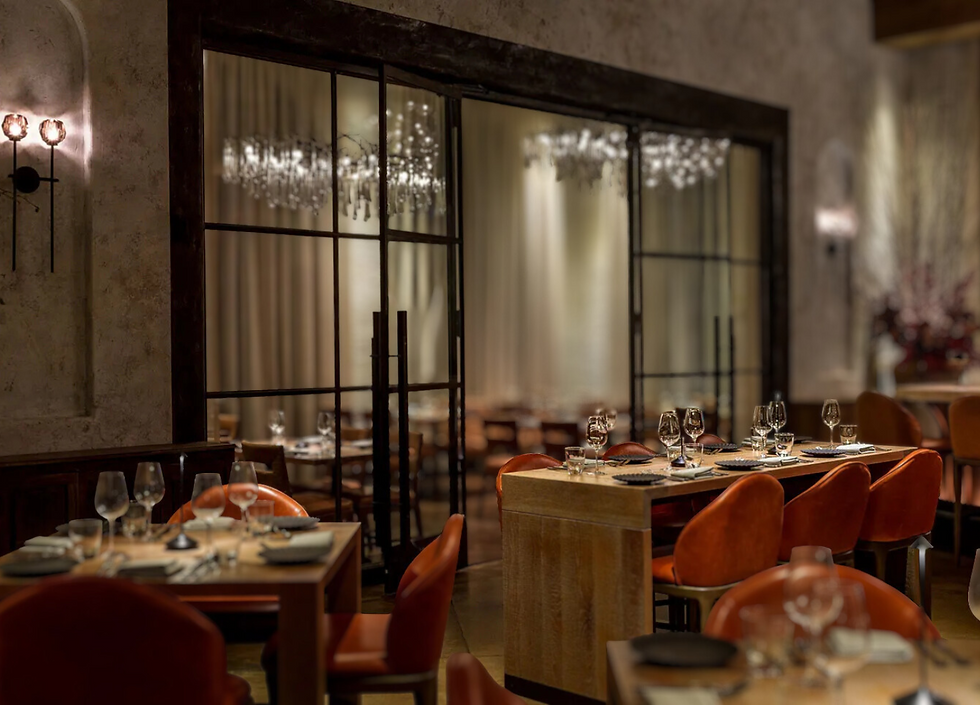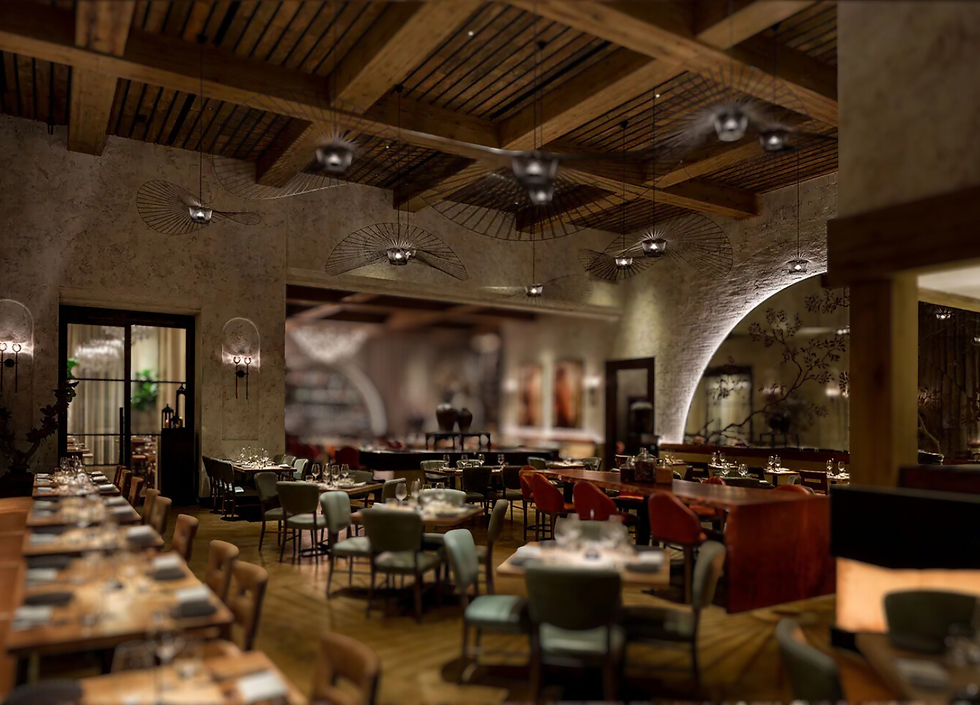The Empty Chair at the Table
- brunplotz
- 15 minutes ago
- 5 min read

The plan was simple.
Book a table for six at Rumi’s Kitchen in Houston, the Persian hot spot off Post Oak Boulevard, where reservations vanish weeks in advance. Corner banquette secured. Candlelight soft enough to flatter everyone and bright enough to gleam off the crystal wine glasses. We walked past the glowing bar and wine wall into that glamorous hum of old-world-meets-modern architecture. Flames licked at the cooks working in full view of the dinner guests. Everyone was excited to try the authentic gourmet recipes featured in the food section of the local paper and magazines.
The guest list was our usual dinner party crew, time decided well before securing the reservation, and everyone eager to catch up. To swap stories, share laughs, and create new memories.
Easy peasy, until it wasn’t.
Thirty minutes before the reservation, I received a text from the usual culprit: “Running fifteen minutes late.” Not ideal—I’d heard they don’t seat parties until all members have arrived. But fifteen minutes isn’t bad. Have you seen the valet line outside this place? It could swallow fifteen minutes whole.
Worst case, we’d grab a drink at the bar and wait.
Luckily, they do seat incomplete parties. After hugs in the entryway, the hostess led us to our cozy corner for the next few hours, where we were all excited to settle in. Fifteen minutes bled into thirty, barely noticed with the server making introductions, going over the specials, and starting us on appetizers and another round of drinks.
Then came the text we half expected yet hoped wouldn’t arrive: “Can’t make it.” No explanation. Just a clipped decline. The emotions swelled at the table—disappointment, acceptance, even a bit of anger bounced between the five filled chairs. Unfortunately, last-minute texts to bail on plans, times set, and reservations kept were getting more and more frequent, to the point of being called a flake.
Yet, sitting there between dueling conversations, I couldn’t help but think about rooms and roles and how we measure success by how full everything looks. The curated guest list. The full calendar. The busy life. How often we forget that the spaces that suddenly open in our life, our calendar, and our table are meant to shape us, handing out lessons of their own.

We Think a Full Table Is What Makes It Real
It’s a human thing. We plan the perfect evening, text confirmations, pick the outfit, and imagine how great it will be. Then someone cancels. The rhythm we rehearsed dissolves. We meet silence we didn’t plan for, awkward beats we didn’t schedule, and the kind of unfair that stings when you did everything “right.”
I went down that familiar trail: if I’d known the seat would be empty, would I have invited someone more reliable? Booked the table at all? Would I have risked the coveted empty chair at a crowded restaurant that got a side-eye from the server when told that person wasn’t coming? Or would I have moved the date, chosen a different restaurant, or picked a place that didn’t require reservations in the first place to spare us the embarrassment of a glaringly empty seat and a flaky friend?

Sometimes the Empty Chair Isn’t a Detractor but the Path.
We love the idea of dinner parties and large gatherings. Overlapping conversations, spontaneous laughter, and plates delivered to the table in perfect order. We want the cozy corner crowded with voices, easy camaraderie, and a photo-worthy moment that proves we belong, or at least gives us something to post on the ’gram.
Who wouldn’t want that? It’s aesthetically pleasing, a way to connect with important relationships and wash away the stress of the workweek now in everyone’s rearview mirror.
But sometimes the loud, wild fun of a night at a trending restaurant isn’t where the lesson lies. More often than not, the truth we need to learn about friendship, patience, and grace arrives in the quiet of an empty chair. The pause and exchange of knowing looks that force us to hear our inner voice when no one else wants to say it out loud: another event our so-called friend bailed on, leaving everyone wondering: Why does this keep happening?
It’s uncomfortable, awkward, and a bit glaring in the moment.
Yet on the other side of that discomfort is something richer. A deeper presence. A sturdier understanding. A version of ourselves who can hold a seat at the table without proof that the table is full. Not because we lacked charisma, but because absence blocked the view, only giving it up once someone was brave enough to say, let’s start anyway.

We Delay the Dream Because the Missing Feels Too Personal
If someone had told me how often plans reshuffle, how guests cancel, how the thing you design with your whole heart can change in an instant, I might have limited my life to easy plans and sure things.
But here’s what you don’t see until you sit with the empty seat: you learn as you host. One toast still leads to five clinking glasses. One question leads to dozens more. One story told to the people who showed up bleeds into many more, even when the sixth chair remains unfilled.
Every awkward pause you bridge, every beat you breathe through, every topic you carry solo—that’s where the muscle builds. That’s where the clarity and grit come from. The empty chair doesn’t just expose a gap. It forges the person—and the group—that can carry forward despite the unwanted and unexpected.

Don’t Let the Full Table Setting Fool You
A packed reservation looks impressive. Every seat filled, everyone looking their best and ready to take photos to document the night. It makes you feel like this is what matters most, proof you’re connected, proof that you belong.
But that’s surface-level stuff. Belonging is foundational to who we are. Necessary for survival at one point in time.
Yet authentic connection, companionship, and friendships happen when the table isn’t perfect. When a chair stays empty and the night continues anyway. When the server clears away the untouched place setting, and the rest of us order entrees and tell stories. That’s when you realize strength isn’t in the numbers, it’s in the presence of those you love staring back at you from around the table.
Belonging and fulfillment don’t look like a flawless headcount or a full table. What I saw in that chair was possibility, room for growth, for change, for adding new seats and inviting different friends. A reminder that life changes and people come and go like seasons in our lives.
That absence isn’t always a loss. Sometimes it’s an opening. A chance to expand, to welcome, to stretch into directions we couldn’t see when I first placed the reservations.
The unfilled chair was never meant to stop us, it was meant to shape us in the movement forward. After the night was over, after the wine bottle ran dry, and the goodbye hugs were exchanged in the valet line.
Will we invite our friend again? Of course. Will he come or flake? It’s anyone’s guess. However, next time, we’ll invite others, expand the group, and hope for more enriching, meaningful conversations and shared moments, regardless of how full or empty the table will be.











